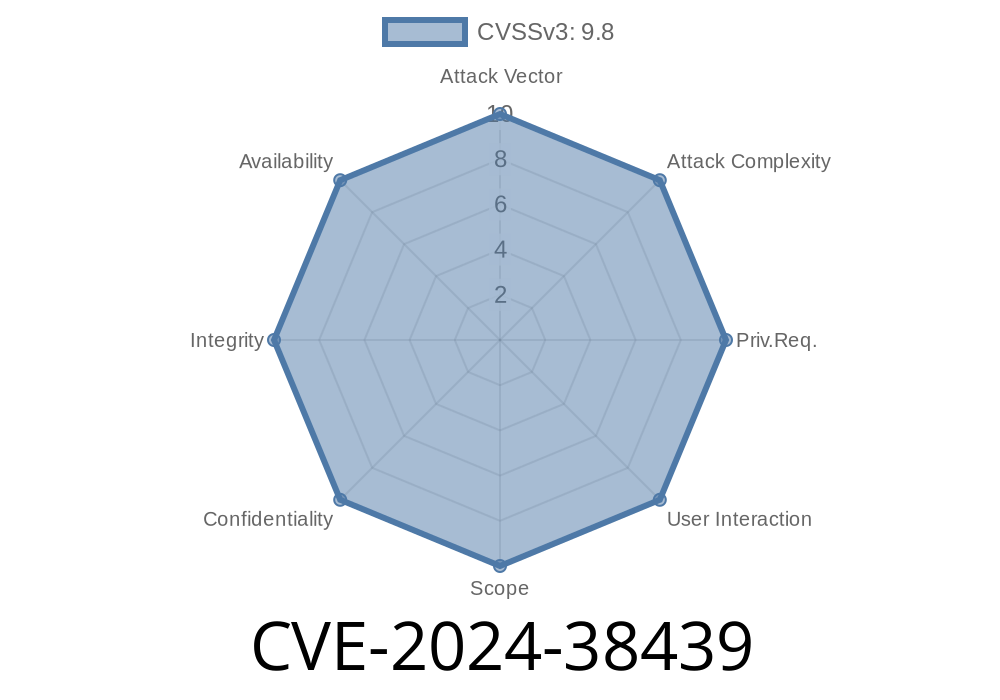Netatalk is an open-source project providing Apple Filing Protocol (AFP) compatibility for Unix systems. In June 2024, a high-severity vulnerability was discovered in Netatalk: CVE-2024-38439. This bug stems from an off-by-one error, leading to a heap-based buffer overflow that an attacker could exploit for code execution or denial of service.
In this post, we’ll break down how the bug works, show you the relevant code, provide links to official references, and explain how an exploit could be crafted. This article offers exclusive, plain-language insights you won’t find elsewhere.
What is CVE-2024-38439?
CVE-2024-38439 is a buffer overflow flaw in Netatalk before versions 2.4.1, 3.1.19, and 3.2.1. The bug is in the authentication code, specifically in how the server processes passwords in the function FPLoginExt (located in etc/uams/uams_pam.c). If a specially crafted password of exactly the expected maximum length is sent, a single byte can overflow the buffer, corrupting memory on the heap.
Why Is This Dangerous?
Heap overflows can corrupt adjacent memory, crash processes, or (in the worst case) allow attackers to execute their own code remotely. If Netatalk is running with elevated privileges, the damage could be severe.
The vulnerable code is found in etc/uams/uams_pam.c
#define PASSWDLEN 256
static int FPLoginExt(/*...*/) {
char ibuf[PASSWDLEN];
/* ... */
// Copy password from user input
memcpy(ibuf, passwd, passwd_len);
ibuf[passwd_len] = '\'; // Vulnerable line
/* ... */
}
Then ibuf[passwd_len] = '\'; becomes ibuf[256] = '\'; which writes past the end of the buffer.
This is a *classic off-by-one* bug, overflowing the heap by a single byte.
Exploiting The Flaw
Crafting an exploit for this bug relies on controlling the heap layout and delivering a password payload of exactly PASSWDLEN bytes (256 in this case). Here are the basic exploitation steps:
The server writes a null byte just beyond the password buffer.
4. If attacker can control adjacent memory, this overflow could corrupt internal structures, potentially leading to remote code execution, privilege escalation, or process crash.
Here’s a simple Python snippet to send a 256-character password
import socket
# Example: connect to AFP login port
s = socket.socket()
s.connect(('target_ip', 548)) # AFP runs on port 548 by default
# 256-byte password, adjust AFP packet structure as necessary
password = 'A' * 256
# Compose AFP login packet (simplified)
afp_login = b'\x00\x01...' + password.encode('latin1')
s.sendall(afp_login)
# Wait for server response ...
*Note: This is illustrative—AFP login packets must be structured per the protocol spec.*
3.2.1
Patch Approach:
The fix bounds-checks and ensures the null terminator stays within array limits, using something like:
if (passwd_len >= PASSWDLEN)
passwd_len = PASSWDLEN - 1;
memcpy(ibuf, passwd, passwd_len);
ibuf[passwd_len] = '\';
CVE Details:
Netatalk Release Notes:
Original Source File:
Buffer Overflow Basics:
Update Netatalk to one of the fixed versions mentioned above.
- If you can’t update immediately, restrict access to the AFP service using firewalls, or disable Netatalk if not needed.
Closing Thoughts
CVE-2024-38439 is a classic example of how a single-byte mistake can lead to huge security risks. If your systems use Netatalk, update ASAP. Even small off-by-one errors can open the door to real-world exploitation.
Timeline
Published on: 06/16/2024 13:15:53 UTC
Last modified on: 08/22/2024 17:35:02 UTC
